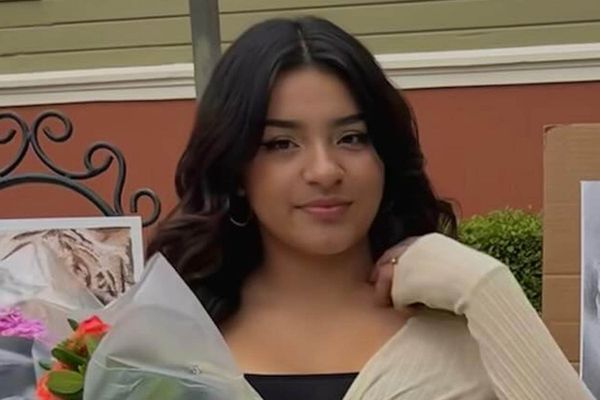
In 2004, Puberty Blues star Brenna Harding appeared in a “Through The Windows” segment of Play School with her friend Merryn and two mums Vicki Harding and Jackie Braw. Little did she know then that the moment would go on to shape her into the incredible queer activist she is today.
The Play School segment was like many others on the show: An eight-year-old Brenna rode dodgem cars and a Ferris wheel at Wonderland amusement park in Sydney with her friend and parents. Harding described the experience to PEDESTRIAN.TV as one of the best days of her life because she felt like a celebrity.
“We got media passes which meant we could go around on the rides and just flash our media passes and didn’t have to get off,” she recalled.
“At eight or nine-years-old, that was one of the coolest things I’ve ever experienced. And then of course it came out and was so divisive.”
PlaySchool (2004) – Two Mums from ABC Pride on Vimeo.
The clip was criticised by many as being controversial when it aired despite the fact that Harding’s parents barely even held hands in it.
News Corp ran a headline at the time (according to The Guardian) calling the show “Gay School” which tbh sounded like something I would’ve enjoyed watching as a kid. Conservatives like former Prime Ministers and known bigoted baboons John Howard and Tony Abbott told reporters they were ~concerned~ with the ABC showing the family’s chill day out.
Federal Minister for (probably white Christian) Children at the time Larry Anthony called it “offensive”. Anthony used the debate around Play School to goad then Opposition leader Mark Latham into supporting the Federal Government’s fucked bill to ban same-sex couples from adopting children from overseas. The government argued the bill would have given “tYpiCaL fAmIlY aRrAnGeMeNtS” priority over the few children up for adoption.
TL;DR: it was a lot of emotion from crusty, old straight men for what was really just a child having a wholesome time for a children’s program on the telly.
For LGBTQIA+ people, it was an attack on their identities and attempted to invalidate the lived experiences of same-sex parents and their children. It’s hard to process that this only happened 16 years ago.
But none of the volatile comments appeared to phase Harding as a child. She told PEDESTRIAN.TV it reminded her just how beautiful her family and their love for each other were.
“All my friends were seeing me on the news,” she said.
“And I apparently just felt like I was famous. I was so thrilled about it.
“I don’t think I’ve ever said this to media before but apparently I said to my mum, ‘I’m as famous as Britney Spears.'”
“As a child of same-sex growing up in the queer community, you’re really primed and you really start to understand your position in the world,” she continued.
“I already knew that I had a different family ‘to the norm’. But I had always thought that was something really special and powerful.
“So to have public figures talking about that and talking about it as a bad thing, instead of making me feel like it was a bad thing it just made me feel like as an eight-year-old, I had more wisdom than all of these adults who were in control of the country.”
“I actually found it really empowering in the end that I got to be this person for same-sex families and that I got to have a chance to convince some of the adults who didn’t quite understand it, that it was okay,” Harding said.
“Infuriatingly, adults who were yet to be convinced we’re more likely to listen to a child who was yet to be proven queer [or] could be straight than the gay adults around them. And so all of a sudden my voice had more power.”
Harding learned from the reactions to her Play School episode that there was power in her own voice. She spoke about her experience as a child of same-sex parents at the NSW Inquiry Into Same-Sex Adoption in 2009 when she was 12-years-old.
She also brought Wear It Purple Day, which advocates for the lives of LGBTQIA+ plus young people, to her school.
She would cut up ribbons in her bedroom and burn the ends to sell them for 50 cents at school to support the not-for-profit organisation. She joined the Board of Directors as Vice President in 2019 and told PEDESTRIAN.TV that Wear It Purple now reaches more than 750 schools, workplaces and organisations across the country.
“It’s been really incredible to be a part of the team and see what we can do with that potential and how we can make the greatest impact,” Harding said.
“I think [being on Play School] shaped not only my activism but also my career as an actor, who I am as a person and the way that I communicate and possibly my queer identity as well.
“It was definitely an understanding and a love of activism that was lit at a young age through Play School that continues to be an essential part of my personhood.”
Play School featured another same-sex family 12 years after Brenna Harding’s episode— twin girls Ezra and Wednesday and their two dads. The video followed the young girls’ dads teaching them how to swim and practicing yoga before bed. It was super cute.
Ezra and Wednesday didn’t face the same level of national backlash as Harding and her family did when the 2016 segment first aired. But it explicitly showed the pair were raised by a same-sex couple whereas the clip with Harding’s mums merely touched on it.
That alone is a testament to how far we’ve come regarding LGBTQIA+ on-screen visibility and telling queer stories in Australian media. A milestone that could only have happened because of the sacrifices Harding and her mums made 12 years prior.
“There was a very little backlash when that happened,” Harding said.
“It definitely didn’t have the same ripple that it did when I was younger. And that was nice to see that we had come further than what at that stage was quite an infantile reaction.
“And we have gotten to a place where that representation on children’s TV is not so shocking.”
“There are still problems—the representation of transgender and gender diverse people is far behind and there’s still cisgender people being cast in transgender roles,” she added.
“But I do think that we have made quite a few gains since 2004. The reaction to Ezra and Wednesday’s episode as opposed to my episode of Play School demonstrated that to a degree.”
Now can we get some gorgeous, gorgeous transgender and non-binary representation on there too? If Grover from Sesame Street can come out as non-binary then Jemima can too.
Wear it Purple Day is held annually on the last Friday of August. Visit the Wear it Purple website to get more information about holding a Wear it Purple Day at your school, organisation, institution or workplace.
The post How Brenna Harding’s Play School Segment Turned Her Into The LGBTQIA+ Activist She Is Today appeared first on Pedestrian TV.







